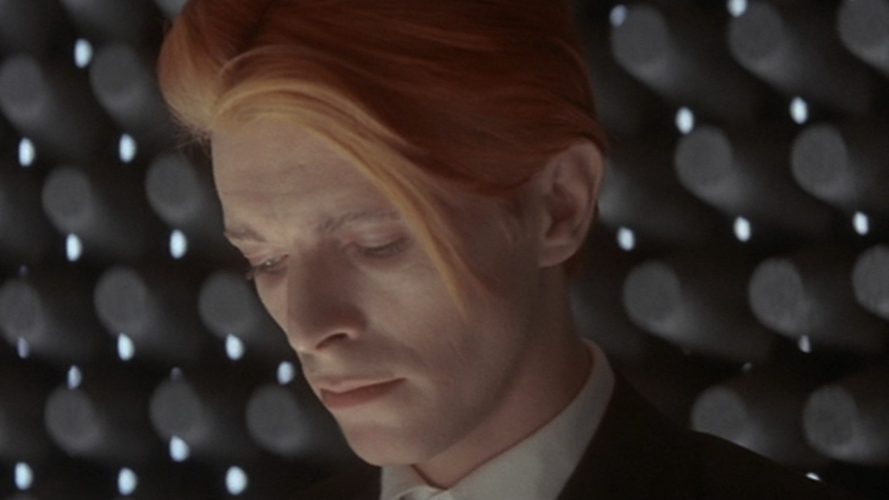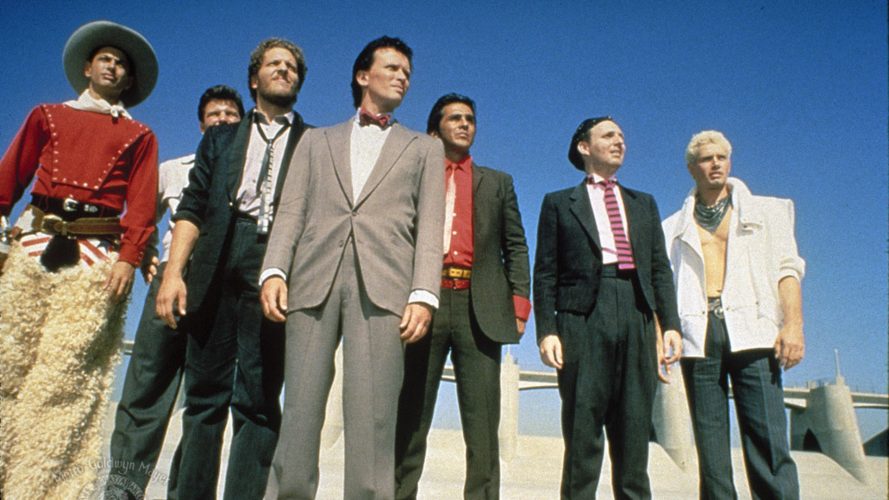

Features
Top 10 Brilliantly Complex Sci-Fi Movies
It’s perhaps no surprise that the sci-fi genre lends itself to complexity. Movies, T.V series, novels and short stories that are built on speculative fiction need detailed exposition laying out all the various intricacies of the distant future, or of the happenings in a galaxy far, far away.
It doesn’t matter if the story is set on some strange new world, populated by creatures very different from humanity, or a future in which (can you imagine?) apes evolved from men. The stories in science fiction need a complex set up in order to create a world that we believe in. By its very nature, sci-fi can start a story simply and as it develops it can grow more complex. Time travel stories are a great example of the type that can really thrive on this type of complexity. Others may try and create an air of mystery by being purposely vague, to make the audience disorientated and allow a more impactful story.
Here are the top ten sci-fi movies that were purposefully made to be brilliantly complex, perhaps to replicate the strange events happening in the story, to highlight the use of the advanced tech being used for the plot or just as a way of keeping the audience guessing to the very end. For sci-fi fans, and movie fans in general, these films can be as satisfying as unpicking a tangled knot, leaving you talking about them long after the credits have rolled.
10 – Predestination (2014)

The time travel story is one of the oldest in science fiction, and with good reason. Quite literally, nearly anything can happen in one of them. You can send your protagonist from the past, to the present and onwards to the future and to any location you desire. Using the time travel device, there’s no limit to what the writer can do.
Based on the Robert Heinlen short story “All You Zombies”, directors Michael and Peter Spierig’s Predestination pushes the envelope in what a time travel story allows. We follow a Temporal Agent, played by Ethan Hawke, who is tasked with travelling through history to stop major disasters occurring, as he begins to use his job to benefit himself. At different points in time, he meets various strange characters while also chasing a serial bomber who also seems to be able to move through time.
Saying any more will spoil the movie, which is both mind-bending and hugely surprising. The intricate plot moves towards a conclusion so shocking that you will be talking and wondering how it all happened after the lights come up. Featuring paradoxes and self-closed loops, we see that living as a time traveller is not the fun and games we may think.
09 – The Fountain (2006)

Starting with Pi in 1998, director Darren Aronofsky has made some wonderfully weird movies. But with The Fountain, an epic and metaphysical look at history, life and mortality, he may have created his strangest. Hugh Jackman plays three versions of Tom Creo, each living at a different time throughout history, and each obsessed with the search for immortality. The film poses huge questions yet doesn’t provide an easy answer to any of them.
Jackman plays a conquistador, searching the New World for the Fountain of Youth, then as a 21st Century doctor whose wife has cancer. He works in vain trying to find a cure rather than focusing on their remaining time together. Finally, as an explorer in space hundreds of years in the future. He explores deep space in a bubble, travelling to a distant nebula.
The intertwining stories all have echoes of each other as we work towards the climax when all questions asked are answered. However, it is not quite straightforward. The film is based in magical realism, and Aronofsky explores our fear of death, our obsession and desire for immortality in a more oblique way. And that, I think, is the point. The massive, difficult concepts the movie poses cannot be answered in straightforward fashion. Instead, Aronofsky gives us a map to try and navigate from.
08 – The Man Who Fell To Earth (1976)

Going by the name Thomas Newton, David Bowie’s alien arrives on Earth to try and find a way to save his planet and family, all of whom are dying from a lack of water. With his far advanced knowledge, he builds new technology and makes himself into one of Earths richest people as a way to finance his return to his home planet. But he creates a fake launch to give the impression he is returning, while staying on Earth and sinking into alcoholism.
People close to him come to realise he is an alien and turn him in to the Government. He is imprisoned for years and experimented on, then waking up one day to realise he is unguarded. As a slightly more naturalised human, he goes back to drinking himself into oblivion.
That summary seems straightforward, but the movie? Far from it. Directed by Nicholas Roeg, who often made films that played with non-linear narratives, The Man Who Fell To Earth may be his best. As scenes change, the timeline may jump several years with no warning or dialogue to let us know. Instead, the characters age in a subtle way and it is that we pick up on to realise that time has passed.
And because Newton, played brilliantly by Bowie, doesn’t age, it becomes harder to pinpoint. Although the lack of aging is one thing that gives Newton away. The editing is almost stream-of-consciousness, and for a first time viewer, it may take a couple of viewings to fully understand the structure and story itself. However, that extra effort is worth it. This remains one of the best sci-fi movies ever made.
07 – Coherence (2013)

We have seen the complexities that time travel can cause, but how about an alternate dimension colliding with ours? And it ruins your dinner party. In Coherence, directed by James Ward Byrkit, a comet is burning brightly in the night sky, while on the ground, a party of friends and ex-lovers is underway. Chaos ensues when the power goes out and some of the group leave to explore the only other house they can see that has power. When they return, they tell the others they left a note on the door, only to find a note left on their door. Written by one of them.
They start to realise that the house they can see contains another version of themselves. The comet must have torn open a portal to another dimension. Are the people who left the same ones who returned? Just how many more alternate dimensions are there?
Filmed on a very low budget of $50,000, Coherence’s complex story works due to its brilliant writing and the actors ability to realistically portray the confusion and sinister motives they, or a version of them, have as the movie winds towards its ending. You might end it in a state of confusion, but there really can be only one conclusion here.
06 – Primer (2004)

With time travel in a movie, it will usually be complex. We must keep track of when and where a character is in time, and the consequences of that travel. Usually multiplying with each trip. In Primer, directed by Shane Carruth, he goes further by making a movie that deliberately keeps the audience disoriented by showing the complexities and repercussions time travel would have in the real world.
Two engineers working on an electromagnetic field that will reduce an objects weight stumble across a method for time travel. Two boxes are built that would allow them to travel backwards in time. They use this to enrich themselves via the stock market, whilst fixing personal problems that have occurred. But they eventually become rivals, with one trying to prevent the experiment from ever happening, and the other using it for personal gain.
Carruth, here writing and directing his first feature, along with starring in it, made a cult sci-fi classic. One that has been well regarded for the complexity of its structure as well as the experimental method of its narrative. Primer doesn’t end with neat and easy answers, but the audience has been picking over and questioning it ever since.
05 – Upstream Color (2013)

Shane Carruth again, in his follow up to Primer. Showcasing again his talent for an experimental narrative approach. Here, we watch the terrible aftermath of two peoples lives when criminals drug them with a strange parasite which puts people into a highly suggestable state. They give all their money and possessions to the criminals and waking up with no recollection of what happened.
Like Primer, not all is as it seems. Along with scenes of the two victims are inserted odd shots of a pig farmer, harvesting the parasite from one of the victims and injecting it into his pigs while recording nature sounds. One of the victims, Kris (Amy Seimetz) connects telepathically with Jeff (Shane Carruth) and they realise they were both victims of the same hypnotic parasite.
Primer may have had moments where the audience is confused, keeping track of the timelines, but Upstream Color can be downright perplexing. Carruth films it beautifully and is always a fascinating movie, albeit a film that comes with no answers even at the end. It is a puzzle the audience has to put together. The parasite has three life stages, mirroring Carruth’s themes of life, behaviour and finally acceptance, creating a mysterious work of art.
04 – Inception (2010)

Rightly regarded as one of the most popular sci-films of all time, as well as critically acclaimed, Inception continues to fascinate audiences 15 years on, only adding to its popularity. We follow Cobb (Leonardo DiCaprio) a shady operative specialising in unique corporate espionage where he enters his targets subconscious mind in order to steal secrets. Based around entering other people’s dreams, Inception is complex from the beginning.
Bringing in Ariadne (Elliot Page) as the rookie dream designer allows Cobb and his team to explain the mechanics of the dream worlds they inhabit, allowing the world around them to be folded and impossible, M.C. Escher-like constructions to be built. Diving through the layers of their targets subconscious, they encounter trained security teams along with Cobb’s own personal demons, so that by the end the audience is wondering just whose reality they are really in.
Playing sleight-of-hand with the audience and creating complex narrative structures is something director Christopher Nolan excels at, and Inception remains his masterpiece in this regard. Spending very little time in the “real” world, Nolan makes sure the audience is never totally sure if what they’re watching is really happening. And for the most part, it isn’t. And his masterfully ambiguous ending has audiences arguing even now about whether Cobb has returned to reality or not.
03 – The Adventures of Buckaroo Banzai Across The 8th Dimension (1984)

Imagine Jeff Goldblum asking “What’s that watermelon doing there?” and you’ll start to get an image of this movie. His character, New Jersey, is asking this to Reno (Pepe Serna) who are both members of the Hong Kong Cavaliers, which are Buckaroo Banzai’s (Peter Weller) personal team of rock stars/adventurers. That’s clear, right? That question goes along with so many others you may ask yourself while watching this.
Director W.D. Richter films this as though the audience is intimately familiar with Buckaroo Banzai, the scientist, rock star, surgeon and adventurer created just for this movie. The film starts with no explanations and just takes off from there. Hugely confusing audiences when it was released, it has since developed into a cult classic.
On first watch, audiences seem split. You will either be amused and intrigued at the lack of references, context or knowledge of who the characters are and what they’re doing, or you will shut it off in annoyance. It takes three or four watches, but eventually the puzzle is solved and you are left appreciating a one-of-a-kind sci-fi action comedy. Unfortunately, we never discover why the watermelon is there.
02 – Solaris (1972)

Russian director Andrei Tarkovsky was one of the great directors of all time. Many of his films focused on a metaphysical or philosophical study of meanings. He would use long, unbroken takes and narrative structures that relied on the characters dreams as much as the actual plot, with his films often placing in the best ever lists.
When he directed a sci-fi movie, he produced one of the best and most influential films of the genre in Solaris. Taking place on a space station orbiting the planet Solaris, the story follows the memories and emotional states of the scientists studying the planet. Our protagonist is Kris Kelvin (Donatas Banionis), a psychologist sent to monitor the psychological states of the crew, as the messages they have been sending back to Earth have become disjointed and confused.
When he arrives, he discovers the crew acting strangely and his friend who was stationed there has committed suicide. Things become even more bizarre when Kris wakes to find his wife Hari sitting by his bed, when she had died ten years previously. He sends this version of her into space, but she reappears in his room. These beings, referred to as “the visitors” have been causing distress among the crew by appearing to them as people from their memories. Kris must work out what the creatures are, and why they are now here.
It’s probably fair to say that sci-fi audiences in 1972 were not expecting a movie to feature dreams, memories and the nature of love so heavily, but Tarkovsky pushed the format further than it had gone before. Solaris doesn’t provide any easy answers to the big questions it raises either, but for the audience, delving into these questions becomes as satisfying as the film itself.
01 – 2001: A Space Odyssey (1968)

It really couldn’t have been anything else. Director Stanley Kubrick’s masterpiece remains a key reference point for many a science fiction movie. It moves from the dawn of mankind, to 2001 and man is now travelling into space, and ending with an incredible 20 minute sequence showcasing the effects, both psychological and psychedelic, our protagonist has after encountering a mysterious alien device. On first viewing, 2001 can leave the audience stunned due to its huge scope and difficult to interpret meaning.
Adapted from Arther C. Clarkes novel of the same name, the film does make more sense if you have read it, although Kubrick adapted and changed the material as he saw fit. Along with the visual effects, which were state of the art at the time and represented a huge leap forward, he also added what would become his ‘open to interpretation’ signature.
The film ends when Dr. Dave Bowman (Keir Dullea) is pulled into an alien monolith orbiting Jupiter and he experiences a surreal phenomenon, seeing strange landscapes, and future versions of himself. He is finally reborn as a starchild, orbiting the Earth in a transparent orb of light. This other-worldly ending has puzzled and intrigued audiences more than 50 years after its release.
-

 Featured Review3 weeks ago
Featured Review3 weeks agoPredator: Badlands ★★★★
-

 Featured Review3 weeks ago
Featured Review3 weeks agoBugonia ★★★★
-

 Interviews3 weeks ago
Interviews3 weeks agoInterview With Director/Actor James Sweeney (Twinless)
-

 Featured Review2 weeks ago
Featured Review2 weeks agoThe Running Man ★★★
-

 Movie Reviews4 weeks ago
Movie Reviews4 weeks agoShelby Oaks ★★★
-

 Featured Review3 weeks ago
Featured Review3 weeks agoLondon Film Festival 2025 – Dreamers ★★★★
-

 Interviews4 weeks ago
Interviews4 weeks agoMartin A. Gottlieb on Finding ‘The Addiction of Hope’
-

 Featured Review5 days ago
Featured Review5 days agoWicked: For Good ★★★★






